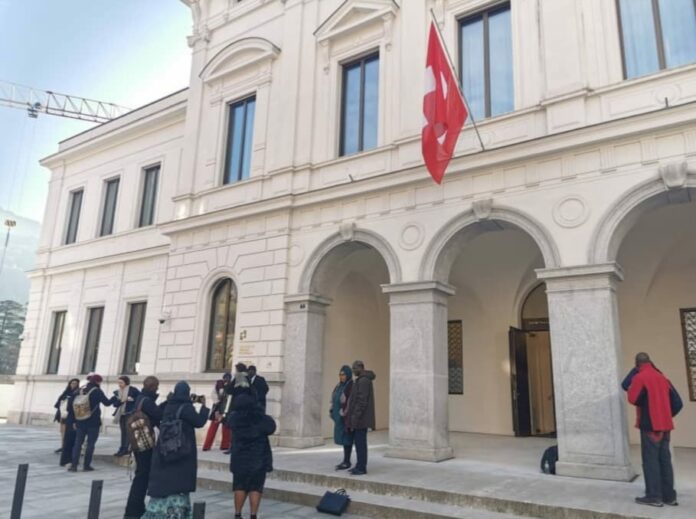By Mustapha K Darboe with New Narratives
Bellinzona, Switzerland–Gambia’s former Interior Minister, Ousman Sonko, told a Swiss court he was “shocked” to learn of protestors being tortured at the National Intelligence Agency in Banjul, in April 2016, and denied any knowledge or participation. Sonko is currently on trial for alleged crimes against humanity carried out in The Gambia during ex-President Yahya Jammeh’s 22-year rule. (Sonko served as Jammeh’s police chief for a year in 2006 and later as interior minister for about ten years.)
Arrested in January 2017, the Swiss Attorney General’s office, along with 10 plaintiffs from Gambia, is accusing Sonko of torture, murder, false imprisonment, rape, and deprivation of liberty, allegedly perpetrated against Gambians during Jammeh’s rule.
On April 14, 2016, at least 14 supporters of the opposition UDP party were allegedly rounded up by members of the police intervention unit. Testimonies before the Swiss federal court and Gambia’s Truth Commission attest to protesters being handed to officials of the National Intelligence Agency, under whose custody Ebrima Solo Sandeng was allegedly tortured to death.
On April 15, rumors had spread of Sandeng’s death, and on April 16, the opposition UDP party confirmed it publicly. Sonko told the Swiss court that he learned of the death of Sandeng on April 16 from his then-police chief Yankuba Sonko.
The arrest and death in custody of Sandeng made news headlines that week. And the leader of the opposition UDP party, Ousainu Darboe, held a press conference at his residence, prior to his arrest, to denounce the alleged torture of party members arrested on April 14.
Sonko, who denied any participation or knowledge in the torture of the protesters, said he only learned “much later” what had occurred, and said the police acted “in accordance with the Gambian law,” with “proportionate use of force” when arresting them.
“When I watched their interrogation video, I could not watch it for the second time… [their torture] was wrong, and it was unacceptable,” said Sonko. Sonko said as minister of interior, he had no control over the NIA or events that took place at their complex.
The Swiss prosecutors are trying to prove Sonko’s responsibility for torture through his participation in various investigation panels as inspector general or for ordering or abetting abuse as interior minister.
Court admits further evidence
On Thursday, Sonko lost a second procedural appeal since the hearing began eight days ago. Earlier this week, prosecutors filed additional archive material with the court from a Gambian newspaper detailing events related to the “illegal execution of nine Mile 2 inmates in 2012.”
The prosecutor argued the material supported their claims that Gambian authorities had carried out a planned and systematic policy of oppression while Sonko held positions as police chief and interior minister. The newspaper clippings show official and public warnings addressed to the population from the Ministry of Interior after the execution of the inmates.
Sonko’s lawyer argued that the filing of the material should be rejected because the execution of the inmates was lawful and could not demonstrate a systematic attack against the civilian population.
The court ruled that the execution of the 9 death row prisoners in 2012 is connected to the crimes against humanity charges in this case. The court admitted the newspaper archives into evidence. The court also admitted a 39-minute video of a June 2016 political rally in Tallinding—when Jammeh threatened to wipe out the Mandinkas, the majority tribe in the Gambia.
In the video, Sonko allegedly made threatening statements, saying whoever holds a protest without a permit would regret it. “The emphasis was law and order. It was not meant to deny people permits. There was no evidence to show that after this statement, people were denied permits,” argued Sonko.
Little clarity on the Asylum note
When Swiss prosecutors raided Sonko’s apartment in Switzerland after his arrest in 2017, they found a handwritten note in a suitcase. He had previously denied the note’s existence, but on Wednesday, his position changed. He confirmed he wrote the note found at his apartment for his Swiss asylum procedure.
Sonko had previously told the court that parts of the note were inaccurate. On Thursday, he declined to answer why he would intentionally write information for his asylum procedure he knew was wrong. Sonko described in his note that he could not stay in Senegal, where he had initially fled, because of its proximity to Gambia.
He said he was followed to the Mbour, a coastal Senegalese settlement, a 4-hour drive from Banjul. He also claimed to have received a directive to harass opposition figures and deny them “police permits” to protest.
He told the court that part of the note, in which he claims Jammeh gave him orders “to shoot and kill the April 14 to 16 demonstrators,” was false.
The prosecutors argued that the note’s contents are consistent with testimonies heard before the Swiss court, testimonies before the Truth Commission, and evidence gathered by Swiss investigators. “To me, you are vague. You have not made reference to any concrete thing,” replied Sonko.
More torture
Musa Saidykhan, a former editor-in-chief of The Independent newspaper, told the court he was detained for 21 days between March and April 2006 and allegedly tortured; he said his hands were broken three times.
“They used a torture equipment I never knew Gambia had… They electrocuted me on the back of my neck and my genitals. I felt dizzy and fell down,” said Saidykhan.
“My right hand was broken three times. They sliced my jaw with a bayonet,” he said. Saidykhan was arrested and allegedly tortured with Madi Ceeday, the then-manager of The Independent, who is one of the plaintiffs due to testify against Sonko on Friday. In 2010, the regional Ecowas court awarded Saidykhan $200,000 in damages for torture inflicted in state custody.
This was a collaboration with New Narratives as part of the West Africa Justice Reporting Project.




